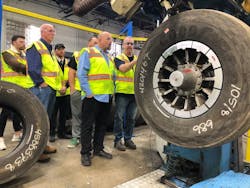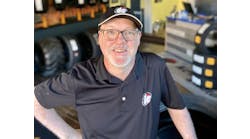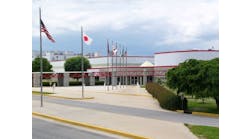Barnwell Locks Down Clients with Inventory, Service and Speed
Barnwell House of Tires is one of the biggest retreaders in the greater New York City area and one of the largest Goodyear retreaders nationwide. But the Central Islip, N.Y.-based commercial truck tire dealership didn’t start that way.
“Back in the day - before the mid-1990s - we were mostly retail,” says Bill Gorman, Barnwell’s vice president and treasurer. Bill runs the company with his brothers, Jim Gorman, its president, and Kevin Gorman, its secretary.
Their father, the late John Gorman, founded House of Tires in 1962. In 1971, he acquired another independent tire dealership, Barnwell Tire, which had opened in the 1930s.
The combined entities evolved into today’s company, which operates two retread plants - one in West Babylon, N.Y., and another in Connecticut.
Barnwell had been selling retreads produced by a third party since the 1980s. The brothers and their father had talked about opening a retread plant at different points, “but we couldn’t pull it off,” says Bill.
As time passed, “we looked around at our competition on Long Island. And Jim had developed a really good service base.”
Barnwell took the plunge and opened the West Babylon plant - its first retread shop - in 2000. “It was the only way to grow,” says Bill. “The only way to compete and control the customer was by having our own plant. It was costly to get the plant up and running. But it ignited our growth.
“We started picking up more national accounts. We were kind of the old new-kid-on-the-block. Our business had been around.”
Retread sales grew quickly. In 2018, Barnwell added a second retread plant - a facility that had been operated by Toce Brothers, a longtime commercial tire dealership in Connecticut. The Toce acquisition also provided Barnwell with three additional stores.
Barnwell currently has 11 locations throughout New York, New Jersey and Connecticut.
The secret to the company’s growth is simple, says Bill.
“It’s about providing quality and service,” which includes “having the inventory to do that. Inventory is a key component. You can have a good price, but if you don’t have the inventory on-hand - the casings and stock units - you can’t properly serve the customer.”
The West Babylon plant produces more than 300 medium truck tire retreads per day, says Kevin, who notes that turnaround time is key.
Barnwell turns retreads around in seven to 10 days. That’s from casing pick-up to the delivery of finished products.
As production at its plants has increased, Barnwell has stayed current with equipment. The company’s retread plant managers “put in a budget at the beginning of the year and list what they think they will need,” says Bill. “Then we fight over that and allocate dollars. We look at what we need and what we don’t need and then we place the order.
“Every year, we’re replacing equipment. Two years ago, we replaced a buffer” at the West Babylon plant. “We replaced our chambers. We just put in a brand new compressor. We just put in a new extruder.”
The West Babylon plant’s boiler “is only two or three years old,” notes Bill.
“We have a list of equipment and know the age of each machine,” says Jim.
Barnwell plows 4% to 5% of its annual retread revenue back into its production facilities.
Retreading “has helped us get into larger fleets,” notes Bill. “Prior to that, we were pretty much doing business only on Long Island with fleets that had one to 25 trucks. Having that first retread plant allowed us to deal with bigger fleets.”
Ryder is Barnwell’s biggest national account customer. “We’re pretty much serving most of their locations in this area,” says Bill.
“FedEx is another big customer. The trend in the commercial tire business is toward national accounts. That’s where the volume is. And there are a lot of service dollars there.”
“If you’re just providing tires, you need to offer that extra piece of the pie,” says Kevin.
“You need that attachment,” explains Jim. “If you’re selling retreads, that helps.”
Other services - like wheel powder coating, which Barnwell performs at its West Babylon plant - can help seal the deal with customers, too.
The dealership also is working to grow its local book business. “Being in such a densely populated area, every national account has a presence here,” says Bill. “But you can’t pay your bills with credits. We need that local business.”
One massive local customer is the City of New York Department of Sanitation. Barnwell has the exclusive contract to supply the agency with new truck tires and another contract to supply it with retreads.
The department operates more than 2,000 waste haul trucks, with an average of 10 wheel positions per vehicle.
“A lot of work went into landing that contract. We actually had a couple of strikeouts before we hit it.”
Heavily loaded waste haul trucks can burn through tires quickly, making retreadability a high-demand feature, according to Jim.
“We are very aggressive in tracking tires and providing cost-per-mile,” he says. “And we have a system where we keep inventory close to the customer, so we can provide rapid response.”
Barnwell also sells new tires and retreads to privately held sanitation companies, which are highly focused on cost-per-mile.
A year “is considered a very long time” for a waste haul truck to run a new tire.
More of Barnwell’s fleet customers are turning to retreading as a cost-saving option. Highlighting technology advancements in tread rubber and the retreading process is important, according to Kevin.
“The compounding has improved tremendously,” he says. “Years ago, you had one compound and you hoped it worked on everything. Now you have industry-specific compounds. You have a waste haul compound. You have an over-the-road compound. You have a pickup and delivery compound.”
“We really utilize waste haul and regional tread compounds in this area,” adds Bill. “And the retreading process has continuously improved.”
Plant equipment “technology has gotten more precise,” notes Kevin.
“The retread business is simple,” says Bill. “You have to be able to service the customer. That requires people, inventory and capabilities.
“Our biggest challenge as a company has been putting the infrastructure in to manage these things - creating an HR department, an accounting department and a billing department.
“Taking on new national accounts and doing all of that large fleet business requires more sophisticated procedures that are unique to each customer,” he explains.
“Adjusting to that and making it happen seamlessly is a challenge. But it’s something I think we’ve handled really well.
“If you can bill a customer properly, you can get paid, you can continue to do business and you can continue to grow. If you don’t bill, nothing happens.
“I think retreading is going to continue to grow,” he says. “Anything that extends the life of a tire is going to appeal to customers. It boils down to cost. Any major fleet is going to understand the savings provided by retreading.”




